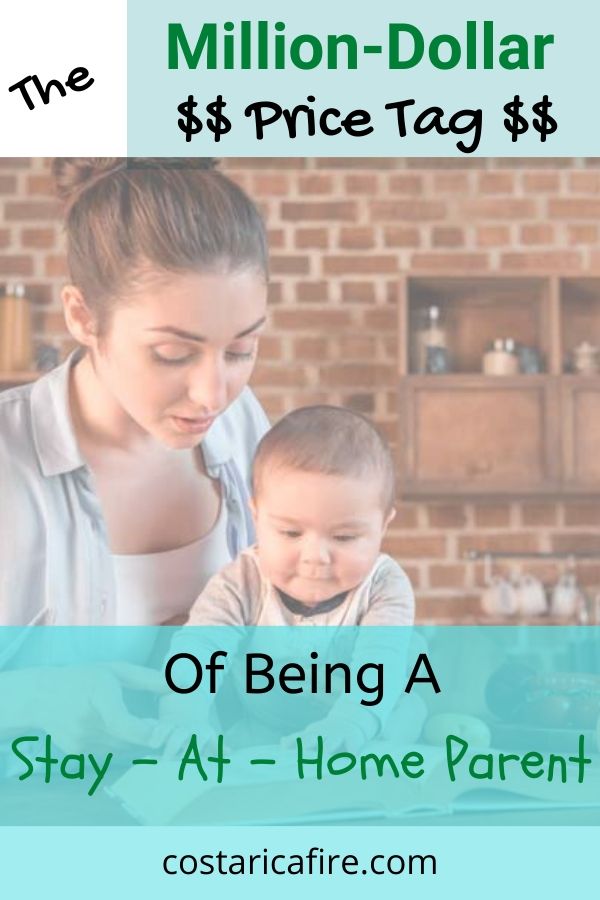This post is inspired by a back-and-forth I had with Accidental FIRE about his post on Earning More and Spending Less.
Accidental Fire wrote about the tendency to spend more as income rises, which causes a surprising amount of credit card debt among high-net-worth households. I then commented about how dual-career couples with kids often experience increased costs, not just because of lifestyle inflation, but also the steep costs associated with outsourcing more of the household, to which Accidental FIRE replied:
“The dual income thing needing additional services is a huge topic and deserving of blog posts on it’s own. It can be controversial too. For instance my street is an anomaly in the DC region, most married couples with kids on my street have a stay at home parent. You hear that you can’t afford to live near DC w/out 2 incomes but it’s far from the truth. And the working parent doesn’t make an exorbitant salary. Exorbitant by Appalachia standards – yes, but not for here. In many ways the second job with the additional costs of transportation, day care, clothes, etc isn’t worth it. Financially that is. But if it takes a career for both parents for them to be fulfilled that’s another matter.”
The Bold was added by me because that was the part that inspired this post:
Is it really not worth it financially for the second parent to work, once you factor in the additional costs of transportation, daycare, clothes etc.?
Of course, there are many reasons why one might choose not to work – but this post is a consideration of just the financial (income and expense) dimension.
We are a dual-career couple who both worked while raising our kids
We are empty-nesters now, so the costs I recall are 15+ years old and not inflation-adjusted, but they still were exorbitant.
We spent $13,000 on full-time daycare for one child, plus a similar amount for babysitting for the second child. Clothes, dry cleaning, transportation, and office lunches add several thousand on top of that. We invariably did more take-out in lieu of cooking at home, outsourced the housecleaning and ordered more deliveries, all of which made day-to-day living more expensive.
While Scott and I both had six-figure jobs, it put us in a higher tax bracket and left us open to the marriage penalty (which is when spouses end up paying more in taxes by virtue of being married than they would have paid as unmarried individuals). At one point, I mentioned to Scott that we could save thousands by divorcing, and he was aghast — I guess I’m truly the mercenary one.
We raised our kids in New York City, and once you factor in the high state and city tax rates, you’re looking at cutting your income by 40% or more after taxes. A six-figure income can drop to well below once taxes are taken out. With tens of thousands in daycare and other costs, It does seem like there’s no way the math would work for both parents to keep their jobs and still come out ahead financially, unless both parents were pulling in very high incomes.
The cost-benefit analysis over one year grossly underestimates the long-term impact

However, the salary you make in one year isn’t the only check mark in the benefit column.
Typically, the working parent earns other compensation than just the salary – most notably, the opportunity to contribute to a retirement plan, or even a retirement match. While a non-working spouse can contribute to an IRA, that money would have to come from the working spouse’s income, so it’s a drag in the one-working-parent scenario but not when both parents are working.
In addition, salaries typically grow year-over-year, and the increases are a percentage of the previous year’s salary. Therefore, the income in year one sets the stage for subsequent increases – there is a growth factor you need to add into the benefits column. That growth factor compounds every additional year that you work.
Finally, compensation typically increases with years of experience. Take a year off, and you miss a year of career progression. Take several years off, and you risk a career plateau, if you can get back at all.
Flexjobs lays out the costs of taking time off from work in terms of wages, wage growth and hit to retirement. Using a $40,000 base salary, the cost of taking 10 years off is $1.1 million! This includes:
- $400,000 in lost wages;
- $369,870 in lost wage growth;
- $331,452 in lost retirement assets and benefits
- $1,101,323 in total income lost
10 years off means that you stay home till your child enters middle school. If you stay home for 20 years, or till your child is through high school, the total income lost increases to over $1.7 million. Even taking five years off costs $642k.
Remember these are calculations for an income at $40,000. If you have higher earning potential, your income lost is much higher because your wage growth and retirement contributions will be proportionally higher.
The Center For American Progress offers an interactive calculator so you can run different scenarios based on salary, years out of the work force, expected retirement contribution and expected match.
Taking time off also carries a high opportunity cost

Neither Scott nor I ever ran the numbers on the financial hit, because we both wanted to have careers. I knew the short-term, outgoing costs would be high but I was much more worried about the opportunity cost of dropping out of the workforce for even a short amount of time. Your marketability goes down faster than you think.
I work in Human Resources, and even more specifically in recruiting. Employers overwhelmingly favor candidates who are currently employed or who have very short gaps (i.e., less than six months) in employment. When you take yourself out of the workforce for years, even if you do it voluntarily, you run the risk of having a very difficult time getting rehired and certainly not returning at the same level.
Of course, there are people who successfully onramp back into full-time employment. (You can help yourself by answering these 10 questions prospective employers have, but might not ask outright, about your time off.) There are significant obstacles to finding a job after taking time off, and it’s hard to think proactively about a 10-, 20- or 30-year career as a bleary-eyed, exhausted new parent.
What would I advise my own daughters to do?
Being in Human Resources and having grown up in New York City, a progressive and PC place, I instinctually wrote this entire post to be gender-neutral (i.e., working parent in lieu of working mom). But generally, in dual-career households, the question/ burden/ dilemma of “should I stay at home or continue to work?” mostly falls on the mom. With two adult daughters, do I try to influence my daughters to make the same choice I did?
Anyone who is already a parent knows that kids never listen to them, so I don’t even bother trying to give my kids advice. When my kids needed coaching for job interviews, I sent them to my business partner! That said, I had both of them read a personal finance book as teenagers (I picked Suze Orman’s “Courage To Be Rich”) so they can have a foundation in good financial management and make their own decisions.
They’re not even in serious relationships, much less contemplating kids, but when it gets to that stage, I’ll probably recommend other books that specifically focus on the work/ family juggle. I recently read Couples That Work by INSEAD professor Jennifer Petriglieri, and it’s an excellent read on how couples can share key career and life decisions from the stay-at-home v. work question to mid-life career changes to the empty nest/ retirement phase. Another eye-opening book is The Feminine Mistake by Leslie Bennetts.
I do think my daughters watch what I do and appreciate the opportunities I have had to pursue my passions, build a body of work I’m proud of, and contribute to the household. I know that I was inspired by my own mom — an early side hustler (before that was a Millennial thing) with gigs selling Avon and doing part-time consulting in addition to a busy day job and raising a family alone (my parents divorced before I was one). My daughters at least know that you can work and still have a full family life.
There is no one-size-fits-all decision but at least go in with ALL the costs in mind
I have friends who have run the gamut from stay-at-home 100% to work 100% to part-time work or a lifestyle business built around family time.
In terms of fulfillment there is no one-size-fits all decision.
In terms of financials, make sure you weigh all the costs, not just the immediate ones but the long-term opportunity cost as well.



 We are Scott and Caroline, 50-somethings who spent the first 20+ years of our adult lives in New York City, working traditional careers and raising 2 kids. We left full-time work in our mid-40’s for location-independent, part-time consulting projects and real estate investing, in order to create a more flexible and travel-centric lifestyle.
We are Scott and Caroline, 50-somethings who spent the first 20+ years of our adult lives in New York City, working traditional careers and raising 2 kids. We left full-time work in our mid-40’s for location-independent, part-time consulting projects and real estate investing, in order to create a more flexible and travel-centric lifestyle.  Financial independence and early retirement is not something we originally focused on, but over time realized it was possible. Our free report,
Financial independence and early retirement is not something we originally focused on, but over time realized it was possible. Our free report, 








Wow this is a great post with lots of nuance and data to back up your statements. You’re right, there’s no one size fits all in this matter for sure. I feel that if both parents have a desire to have careers because they are passionate about a field (computers, law whatever), then go for it. But if one of the parents is working only to buy more stuff – not because the income is necessary – then perhaps they should rethink. I think the latter is more common than most folks realize, and there’s lots of shades of grey between the two extremes as well.
Glad I could help inspire your post!
I agree that a lot of people make decisions reflexively and not proactively. Or they make a decision for one point in time and don’t revisit often enough. THANK YOU for inspiring this post — it was interesting to reflect on this topic, as my kids are now 18 and 24 (wow, I feel old just writing that — pretty soon, I’ll have to start my posts with, “Back in the day…”!).
What a timely post. I just finished mine from the perspective of the motherhood penalty. The opportunity cost is definitely there. My father was the one that stayed home and this certainly affected his retirement. I myself am trying to find the balance. We had planned to put the baby in childcare for a few days or have my parents come in a few days a week, but with the pandemic, that plan went out the window. I’m glad I saved early in my career, but I’m of course worried about the lost opportunity for wages and investment growth. Thanks for recommending those books. Adding them to my list now.
Will check out your post — great minds think alike! I agree that this pandemic throws a big curveball to plans. That said, everyone is in the same boat so the employment gap happening now should be less disruptive, at least in competition with others who will likely have a similar gap.
I appreciate this post, even though we are making the decision to have my husband stay at home. I won’t even say the cheesy “It’s worth $1 million to us!” haha! However, there are other benefits to having only one partner focus on a career outside the home while raising kids you have left out of your equation. With him at home, I have not had to bear the “mental load” that most working mothers I know deal with while the kids are young; hence, I’ve been able to make much faster career gains (including increased schooling and networking opportunities) leading to higher income. Also, as an immigrant, it would take him many years to get to a position of being able to earn even $40,000/year (let alone finding a job at that salary with benefits!). Every family has to make their own decisions, and I’m so glad yours worked out for you!
Agree 100% that it’s an individualized decision, and there are so many other factors than financial. Even financially, it can make sense for a spouse to stay at home depending on how long, what the other spouse makes, etc. One book I really enjoyed about the household division of labor was Spousonomics (now retitled It’s Not You, It’s The Dishes). https://www.amazon.com/dp/B00735H7X8/ref=dp-kindle-redirect?_encoding=UTF8&btkr=1
Great post Caroline, and it fits nicely with the most recent comment you left on my blog. As you know, my wife and I have been ‘debating’ this quite a lot recently. No decision has been made, but I would say there’s a very good chance that I will be exiting the work force (at least partially) in the next year. For us, it’s all about reducing stress, because 2 small children and 2 full time jobs are not going to be fun. The opportunity cost, as you mentioned, is my biggest concern. We’re going to hatch out a plan in the coming months, but I really appreciate the advice and perspective of people who’ve gone through it already. Thanks!
It’s so much easier now to start a business, so you could also run some options around starting a business that is built around your family schedule — aka, a lifestyle business. It may take some time before it offsets the office salary you leave behind but it’s doable, and some people actually do much better as a business owner. That’s what happened to me — I consider myself a reluctant entrepreneur, but I went into business for myself b/c it was a way of getting the flexibility and lifestyle (my youngest was 7 at that point so not too young). It took 4 years to match my office salary but then I did, exceeded it, and it’s been great since.
How about work in your 20s for a 10 year period and reach FI in your early 30s and reach FI once your kids are born? That was our reality and we’re so happy my wife was able to retire early once baby 1 was born and I only work 73 days out of the year (and will be able to be done completely by the time hopeful baby 2 arrives).
Here’s another great article written by my friend Chrissy as a guest post on Tawcan’s blog where she really digs into the costs of what a stay at home parent “earns”.
https://www.tawcan.com/cost-of-a-stay-at-home-parent-a-financial-cost-analysis/
That’s definitely a possibility if life unfolds on that schedule. I know people who didn’t meet significant others till their 30’s or beyond, or didn’t happen to think about FI before kids came into the picture. So yes, achieving FI first, then having kids is definitely an option if timing allows!
Interesting concept. But there is also a cost of having someone else raise the kids or daycare, commuting, dry cleaning, work clothes, etc. that needs to be factored in. But why work for an employer? Work part time and or be self-employed.
Yes, there are costs for sure that defray the income, and the costs are so big short-term that it can make the income even negative. However, the costs don’t compound while the income does. That said, I agree that it isn’t just about office work but also your own business, working part-time, working remotely, etc.